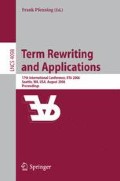Abstract
This paper introduces a new kind of propositional encoding for reasoning about partial orders. The symbols in an unspecified partial order are viewed as variables which take integer values and are interpreted as indices in the order. For a partial order statement on n symbols each index is represented in ⌈log2 n⌉ propositional variables and partial order constraints between symbols are modeled on the bit representations. We illustrate the application of our approach to determine LPO termination for term rewrite systems. Experimental results are unequivocal, indicating orders of magnitude speedups in comparison with current implementations for LPO termination. The proposed encoding is general and relevant to other applications which involve propositional reasoning about partial orders.
Access this chapter
Tax calculation will be finalised at checkout
Purchases are for personal use only
Preview
Unable to display preview. Download preview PDF.
References
Arts, T., Giesl, J.: Termination of term rewriting using dependency pairs. Theoretical Computer Science 236(1–2), 133–178 (2000)
Automated program verification environment (AProVe) (viewed December 2005), http://www-i2.informatik.rwth-aachen.de/AProVE
Codish, M., Lagoon, V., Stuckey, P.J.: Logic programming with satisfiability (submitted), http://www.cs.bgu.ac.il/~mcodish/Papers/Sources/lpsat.pdf
Codish, M., Schneider-Kamp, P., Lagoon, V., Thiemann, R., Giesl, J.: SAT solving for argument filterings, available from: http://arxiv.org/abs/cs.OH/0605074
Dershowitz, N.: Termination of rewriting. J. Symb. Comput. 3(1/2), 69–116 (1987)
Dershowitz, N., Jouannaud, J.-P.: Rewrite systems. In: van Leeuwen, J. (ed.) Handbook of Theoretical Computer Science, Formal Models and Semantics, vol. B, pp. 243–320. Elsevier and MIT Press (1990)
Eén, N., Sörensson, N.: An extensible sat-solver. In: Giunchiglia, E., Tacchella, A. (eds.) SAT 2003. LNCS, vol. 2919, pp. 502–518. Springer, Heidelberg (2004)
Giesl, J., Thiemann, R., Schneider-Kamp, P., Falke, S.: Automated termination proofs with AProVE. In: van Oostrom, V. (ed.) RTA 2004. LNCS, vol. 3091, pp. 210–220. Springer, Heidelberg (2004)
Hirokawa, N., Middeldorp, A.: Tsukuba termination tool. In: Nieuwenhuis, R. (ed.) RTA 2003. LNCS, vol. 2706, pp. 311–320. Springer, Heidelberg (2003)
Hirokawa, N., Middeldorp, A.: Tyrolean termination tool. In: Giesl, J. (ed.) RTA 2005. LNCS, vol. 3467, pp. 175–184. Springer, Heidelberg (2005)
Kamin, S., Levy, J.-J.: Two generalizations of the recursive path ordering. Department of Computer Science, University of Illinois, Urbana, IL (1980) (viewed, December 2005), available at: http://www.ens-lyon.fr/LIP/REWRITING/OLD_PUBLICATIONS_ON_TERMINATION
Khrishnamoorthy, M., Narendran, P.: On recursive path ordering. Theoretical Computer Science 40, 323–328 (1985)
Kurihara, M., Kondo, H.: Efficient BDD encodings for partial order constraints with application to expert systems in software verification. In: Orchard, B., Yang, C., Ali, M. (eds.) IEA/AIE 2004. LNCS (LNAI), vol. 3029, pp. 827–837. Springer, Heidelberg (2004)
MiniSAT solver (viewed December 2005), http://www.cs.chalmers.se/Cs/Research/FormalMethods/MiniSat
Swi-prolog (viewed December 2005), http://www.swi-prolog.org
The termination problems data base (viewed December 2005), http://www.lri.fr/~marche/tpdb/
Tseitin, G.: On the complexity of derivation in propositional calculus. Studies in Constructive Mathematics and Mathematical Logic, 115–125 (1968); In: Siekmann, J., Wrightson, G. (eds.) Automation of Reasoning, vol. 2, pp. 466-483. Springer, Berlin (reprinted 1983)
Tyrolean termination tool (viewed December 2005), http://cl2-informatik.uibk.ac.at/ttt
Wielemaker, J.: An overview of the SWI-Prolog programming environment. In: Mesnard, F., Serebenik, A. (eds.) Proceedings of the 13th International Workshop on Logic Programming Environments, Heverlee, Belgium, Katholieke Universiteit Leuven, December 2003, CW 371, pp. 1–16 (2003)
Zankl, H.: Sat techniques for lexicographic path orders (May 2006), http://arxiv.org/abs/cs.SC/0605021
Author information
Authors and Affiliations
Editor information
Editors and Affiliations
Rights and permissions
Copyright information
© 2006 Springer-Verlag Berlin Heidelberg
About this paper
Cite this paper
Codish, M., Lagoon, V., Stuckey, P.J. (2006). Solving Partial Order Constraints for LPO Termination. In: Pfenning, F. (eds) Term Rewriting and Applications. RTA 2006. Lecture Notes in Computer Science, vol 4098. Springer, Berlin, Heidelberg. https://doi.org/10.1007/11805618_2
Download citation
DOI: https://doi.org/10.1007/11805618_2
Publisher Name: Springer, Berlin, Heidelberg
Print ISBN: 978-3-540-36834-2
Online ISBN: 978-3-540-36835-9
eBook Packages: Computer ScienceComputer Science (R0)

